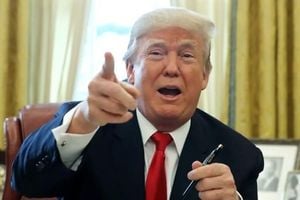El Salvador's recent embrace of Bitcoin has marked the nation as a key player on the global cryptocurrency stage, and recent developments have only solidified its impact. President Nayib Bukele's ambitious strategy to integrate Bitcoin as legal tender has garnered both attention and debate, with its recent surge past $100,000 adding fuel to the discussion.
Bukele's Bitcoin adventure began back in 2021 when the Central American country became the first nation to adopt the cryptocurrency as legal tender. The initial reception was mixed; proponents hailed it as innovative, but critics remained skeptical. They pointed out potential risks tied to price volatility and insufficient infrastructure to support such drastic financial changes.
Fast forward to now, and the financial gamble appears to be paying off. El Salvador's reported investment, initially around $333.59 million, is now valued at over $600 million—an impressive growth considering the current profit margin of approximately 124%. This dramatic appreciation reveals not just Bukele's faith in Bitcoin but also his confidence in its role as a key asset for the country.
On the global stage, the cryptocurrency's value has fluctuated greatly, but it recently set another milestone by surpassing $100,000 for the first time. Elon Musk, the world-renowned entrepreneur, publicly praised El Salvador's Bitcoin investments, describing them as “impressive.” This acknowledgment from Musk indicates the growing influence and recognition of Bitcoin within mainstream financial discussions.
One of the compelling aspects of El Salvador's Bitcoin strategy is its continued commitment to acquiring more of the digital asset. The nation's government has been purchasing one Bitcoin daily, accumulating a total of around 5,955 BTC. This approach not only enhances the country’s overall portfolio but also firmly establishes its position as a pioneer of Bitcoin utilization.
Despite occasional setbacks, such as fluctuations in Bitcoin's market price—where BTC recently retraced to around $96,600 representing about 2.2% drop within 24 hours—El Salvador's confidence seems unshaken. The government insists on Bitcoin's potential transformative power, asserting it can offer economic opportunities previously thought unattainable.
El Salvador's decision to adopt Bitcoin as legal tender also holds significance for its citizens. A considerable portion of the country's population is unbanked, meaning they lack traditional banking services. By introducing Bitcoin, the government hopes to offer financial services to those on the fringes of the financial system. This angle may make cryptocurrency more than just speculative investment; it positions it as a tool for economic inclusion.
Beyond its national strategy, El Salvador's move has prompted reactions worldwide. Financial analysts and investors are closely watching the situation, evaluating its outcomes against the backdrop of other nations' hesitations to fully embrace cryptocurrency. The success or challenges faced here could serve as case studies for others weighing similar decisions.
The integration of Bitcoin within El Salvador has inspired debates across various socio-economic spheres. While Bukele's enthusiasm remains high, opponents argue about long-term sustainability. They question whether reliance on such volatile currency can effectively replace established financial practices, especially within economies already besieged by challenges such as poverty and lack of infrastructure.
Supporters, on the other hand, see Bitcoin as more than just another asset. They highlight its possibilities for remittances, foreign investments, and economic development as some of the potential game-changers for El Salvador. The hope is simple: leverage its Bitcoin holdings to attract investment dollars and revitalize the local economy through innovative financial systems.
Reflecting on his approach, Bukele recently expressed his confidence, stating, "You can't stay stagnant; you have to be forward-thinking. We are proud to be leading this historic movement for Bitcoin." His comments not only encapsulate the optimistic outlook but also portray the government's determination to see the project through.
Looking forward, the future of Bitcoin and El Salvador remains intertwined. With every rise and dip of Bitcoin’s value, the country finds itself at the crossroads of hope and apprehension. While the successful spikes provide confidence and reinforce the narrative of Bitcoin’s viability, every downturn raises flags about the inherent risks associated with cryptocurrency investments.
The next chapter for El Salvador will require not just steadfast leadership but also the adaptability of its policies to embrace both the risks and potential rewards. Only time will tell if this gamble will set the nation on the path toward substantial economic growth, or if it spells trouble for its financial stability. Meanwhile, the world continues to observe El Salvador's bold experiment closely, watching as it attempts to navigate the turbulent waters of cryptocurrency economics.



